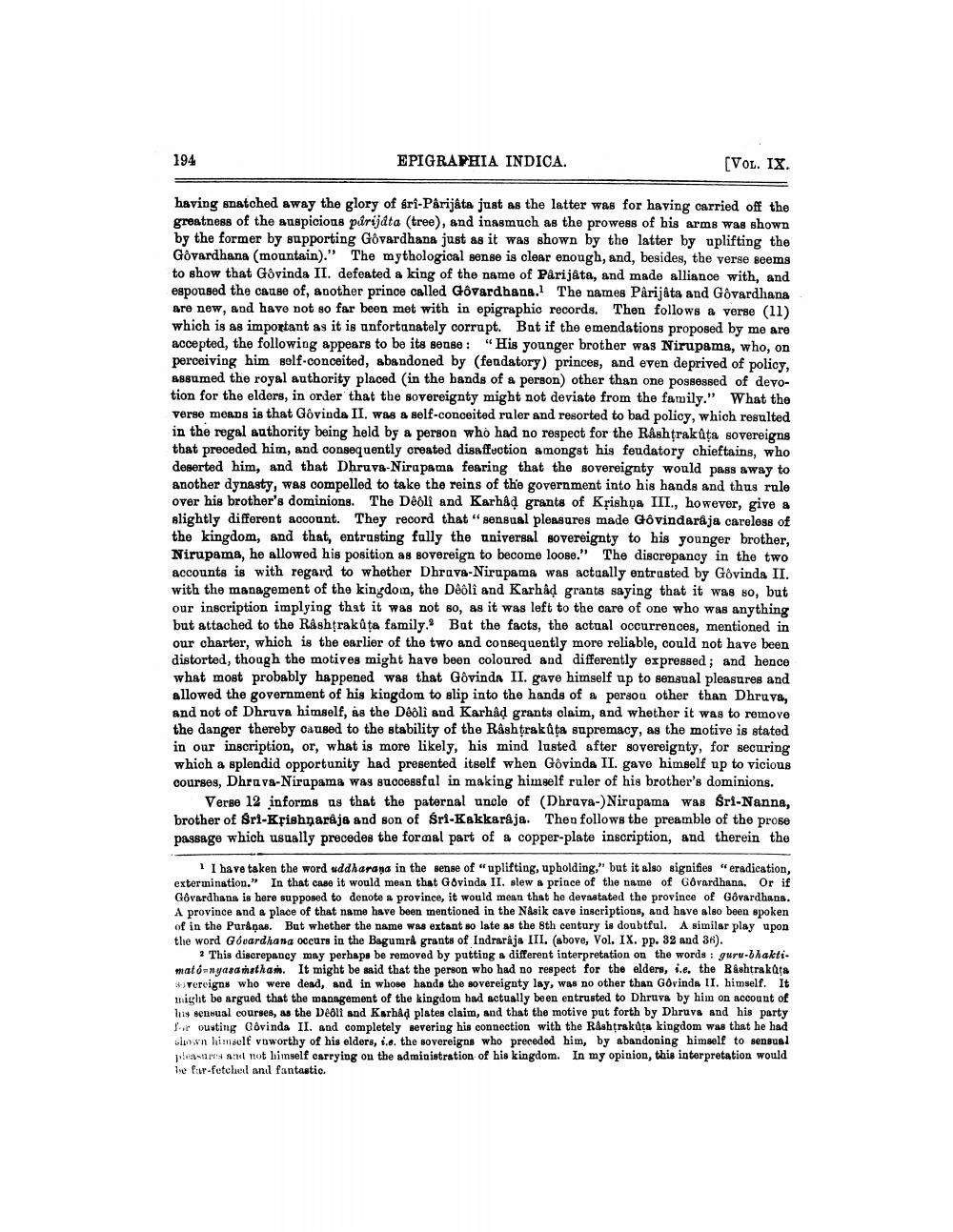________________
194
EPIGRAPHIA INDICA.
(VOL. IX.
having snatched away the glory of gri-Parijata just as the latter was for having carried off the greatness of the auspicious púrijdta (tree), and inasmuch as the prowess of his arms was shown by the former by supporting Govardhana just as it was shown by the latter by uplifting the Govardhana (mountain)." The mythological sense is clear enough, and, besides, the verse seems to show that Govinda II. defeated a king of the name of Parijata, and made alliance with, and espoused the cause of, another prince called Govardhana. The names Parijata and Govardhana are new, and have not so far been met with in epigraphic records. Then follows a verse (11) which is as important as it is unfortunately corrupt. But if the emendations proposed by me are accepted, the following appears to be its sense : "His younger brother was Nirupama, who, on perceiving him self-conceited, abandoned by (feudatory) princes, and even deprived of policy, Assumed the royal authority placed in the bands of a person) other than one possessed of devotion for the elders, in order that the sovereignty might not deviate from the family." What the verse means is that Govinda II. was a self-conceited raler and resorted to bad policy, which resulted in the regal authority being held by a person who had no respect for the Rashtrakața sovereigns that preceded him, and consequently created disaffuction amongst his feudatory chieftains, who deserted him, and that Dhruva-Nirapama fearing that the sovereignty would pass away to another dynasty, was compelled to take the reins of the government into his hands and thus rule over his brother's dominions. The Debli and Karhad grants of Krishņa III., however, give a slightly different account. They record that "sensual pleasures made Govindaraja careless of the kingdom, and that, entrusting fully the aniversal sovereignty to his younger brother, Nirupama, he allowed his position as sovereign to become loose." The discrepancy in the two accounts is with regard to whether Dhrava-Nirupama was actually entrusted by Govinda II. with the management of the kingdom, the Deôli and Karhad grants saying that it was so, but our inscription implying that it was not so, as it was left to the care of one who was anything but attached to the Rashtrakūta family. Bat the facts, the actual occurrences, mentioned in our charter, which is the earlier of the two and consequently more reliable, could not have been distorted, though the motives might have been coloured and differently expressed ; and hence what most probably happened was that Govinda II. gave himself up to sensual pleasures and allowed the government of his kingdom to slip into the hands of a person other than Dhruva, and not of Dhruva himself, as the Deôli and Karhad grants claim, and whether it was to remove the danger thereby caused to the stability of the Rashtrakūta supremacy, as the motive is stated in our inscription, or, what is more likely, his mind lusted after sovereignty, for securing which a splendid opportunity had presented itself when Govinda II. gave himself up to vicious courses, Dhruva-Nirapama was successful in making himself ruler of his brother's dominions.
Verse 12 informs as that the paternal uncle of (Dhrava- Nirapama was Sri-Nanna, brother of Sri-Kfishnaraja and son of Sri-Kakkarája. Then follows the preamble of the prose passage which usually precedes the formal part of a copper-plate inscription, and therein the
1 I have taken the word wddharana in the sense of "uplifting, upholding," but it also signifies "eradication, extermination." In that case it would mean that Govinda II. slew & prince of the name of Govardhana. Or if Gôvardhana is here supposed to denote a province, it would mean that he devastated the province of Govardhana. A province and a place of that name have been mentioned in the Nasik cave inscriptions, and have also been spoken of in the Puraņas. But whether the name was extant so late as the 8th century is doubtful. A similar play upon the word Govardhana occurs in the Bagumrå grants of Indraraja III. (above, Vol. IX. Pp. 32 and 38).
? This discrepancy may perhaps be removed by putting a different interpretation on the words : guru-bhakti. matonyasanathan. It might be said that the person who had no respect for the elders, i.e. the Bashtrakata #voreigns who were dead, and in whose hands the sovereignty lay, was no other than Govinda II. himself. It might be argued that the management of the kingdom had actually been entrusted to Dhruva by him on account of 1114 sensual courses, as the Debli and Karhad plates claim, and that the motive put forth by Dhruva and his party Prousting Côvinda II. and completely severing his connection with the Rishtakuta kingdom was that he had bloon limoelf voworthy of his elders, i.e. the sovereigns who preceded him, by abandoning himself to sensual plasmad not himself carrying ou the administration of his kingdom. In my opinion, this interpretation would le fier-fetched and fantastic.




